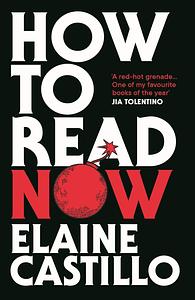Take a photo of a barcode or cover
3.5?
Not a hot-to guide, more of a exploration of writing in many different parts. Really interesting stuff. It made me check out HBO's Watchmen series, which was great, and gave me some backstory on a few things I wasn't really aware of.
Not a hot-to guide, more of a exploration of writing in many different parts. Really interesting stuff. It made me check out HBO's Watchmen series, which was great, and gave me some backstory on a few things I wasn't really aware of.
this was a thought provoking read! elaine castillo asks how we can engage more deeply with the works we consume and take ethics and politics into consideration so that we can think more critically about the way we see things. it’s super in line with my own goals for reading and thinking about books, and felt especially poignant as the 2nd trump administration begins.
castillo’s voice is fresh and witty, which made these essays not only educational, but also enjoyable to read. she pulls in a wide array of literature, film, and TV to examine through the lens of the “unexpected reader.” the essay about joan didion in this book was recommended to me specifically and i really appreciate how well-crafted and well-researched the piece was.
such a great piece of contemporary criticism and a reminder for us to take a deeper look at the art that we interact with!
“…it became patently obvious that much of our literary industry functions as little more than a quaint pastime for its adherents…: a place to merely cosplay diversity, empathy, education. Not a place to truly be diverted from oneself; not a place to be made humble in one's vulnerability; not a place to be laid bare in one's unknowing.”
castillo’s voice is fresh and witty, which made these essays not only educational, but also enjoyable to read. she pulls in a wide array of literature, film, and TV to examine through the lens of the “unexpected reader.” the essay about joan didion in this book was recommended to me specifically and i really appreciate how well-crafted and well-researched the piece was.
such a great piece of contemporary criticism and a reminder for us to take a deeper look at the art that we interact with!
“…it became patently obvious that much of our literary industry functions as little more than a quaint pastime for its adherents…: a place to merely cosplay diversity, empathy, education. Not a place to truly be diverted from oneself; not a place to be made humble in one's vulnerability; not a place to be laid bare in one's unknowing.”
reflective
medium-paced
Studied, thought provoking and insightful. I appreciated the author’s commentary and opening up my white world view. I’ll have to do some further work as I’ve not seen a lot of the films or read books mentioned, which I guess underlines the issue. It just made the close analysis a bit superficial for me as I don’t know the source material.
This is quite a hard review to write, as anyone who has read this might understand. It's rare that I read a book so overtly political, even activist. And Castillo's criticism is of the kind that I hesitate to even begin to disagree with her points.
Her essays all come from an intensely personal place. She discloses the dehumanising effects that sexual abuse, intergenerational trauma, racism, colonisation, patriarchy have had on her *personally*, while also zooming out to speak for how these blights continue to impact Philipinx and other "minorities" in general.
That these horrors have occurred and are still perpetrated on a daily basis in the most "civilised" countries on earth is in no doubt. And Castillo's does a service in pointing out how literature and other art (primarily film/TV) encode and perpetuate them, plus how we as readers can be more cognisant of this. Her writing is moving, fiercely intelligent (sometimes prohibitively so), and has a distinctively millennial voice to it.
Where I found her *argument* lacking was that it failed to properly distinguish between art as criticism and art as commendation. A book depicting abuse can do so to condemn the abuse or lionise it, and anything in between. Castillo knows this, of course, but I felt like she chose to forget this at certain points.
Relatedly, the argument would have been strengthened had it been stricter about distinguishing author from narrator. They're not the same!
I also felt Castillo's tone - what some would surely describe as badass, others just nasty - weakened the book.
Ad hominem attacks, and suggesting some authors are to be taken less seriously because of their whiteness, will not win Castillo many converts among those who actually need to read this book.
Her essays all come from an intensely personal place. She discloses the dehumanising effects that sexual abuse, intergenerational trauma, racism, colonisation, patriarchy have had on her *personally*, while also zooming out to speak for how these blights continue to impact Philipinx and other "minorities" in general.
That these horrors have occurred and are still perpetrated on a daily basis in the most "civilised" countries on earth is in no doubt. And Castillo's does a service in pointing out how literature and other art (primarily film/TV) encode and perpetuate them, plus how we as readers can be more cognisant of this. Her writing is moving, fiercely intelligent (sometimes prohibitively so), and has a distinctively millennial voice to it.
Where I found her *argument* lacking was that it failed to properly distinguish between art as criticism and art as commendation. A book depicting abuse can do so to condemn the abuse or lionise it, and anything in between. Castillo knows this, of course, but I felt like she chose to forget this at certain points.
Relatedly, the argument would have been strengthened had it been stricter about distinguishing author from narrator. They're not the same!
I also felt Castillo's tone - what some would surely describe as badass, others just nasty - weakened the book.
Ad hominem attacks, and suggesting some authors are to be taken less seriously because of their whiteness, will not win Castillo many converts among those who actually need to read this book.
informative
I completely agree with her thesis, and I found the intro and conclusions to be the most compelling. In between, I was a bit lost at times. I really wanted to love it, but I found I just liked it.
This could be titled "How to Live Now" as Castillo takes on a broad definition of reading - reading people, reading situations, reading decisions.
You will never look at another Joan Didion or John Steinbeck book the same again.
The audiobook, read by the author, is highly enjoyable, but you'll also want the book version so you can read and re-read her gorgeous sentences. The best "Works Cited" section ever.
Sourced: christinac__reads
You will never look at another Joan Didion or John Steinbeck book the same again.
The audiobook, read by the author, is highly enjoyable, but you'll also want the book version so you can read and re-read her gorgeous sentences. The best "Works Cited" section ever.
Sourced: christinac__reads
challenging
informative
slow-paced
I have no idea how to review this book. Getting through it was such a chore and I literally remember next to nothing about the content. It wasn’t bad, I just went in expecting this to actually be about literature, instead of “reading” as “interpreting” pretty much anything else. I think it discussed a couple of topics very well, but most of the time I wasn’t exactly sure how the information related to any point the author was trying to make and thus struggled to fully take any of it in, since a lot of the essays didn’t seem to go anywhere or reach any kind of ending. These are essays, so I knew I’d get mostly personal thoughts, I just assumed that I’d leave the book with anything. I literally forgot I even read it until I saw it in my “read recently” just now. I can’t even say “read it” or “don’t read it” because I literally don’t remember anything other than there was a lot of historical infodumps, tangents during which I literally forgot the main topic, and personal anecdotes. It was a book, that’s all I can say.
Interesting but its so hard for me to stay focused when reading non fiction.
4
4




